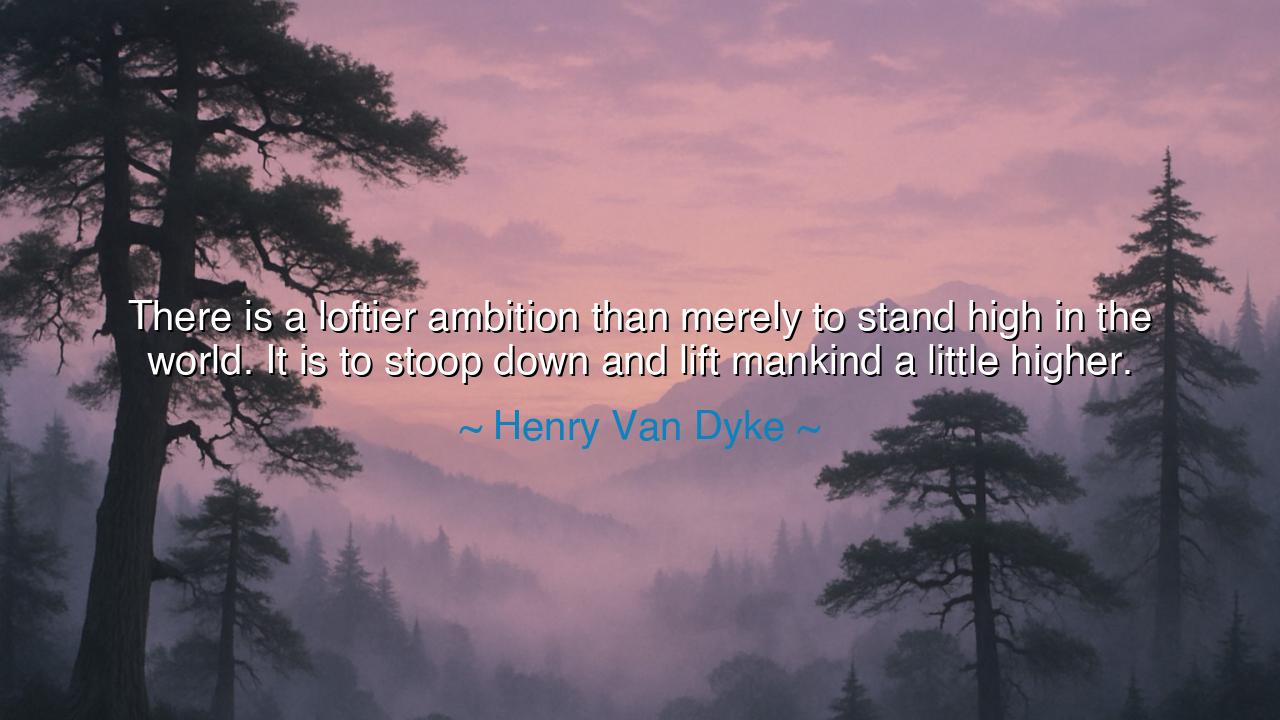
There is a loftier ambition than merely to stand high in the
There is a loftier ambition than merely to stand high in the world. It is to stoop down and lift mankind a little higher.






“There is a loftier ambition than merely to stand high in the world. It is to stoop down and lift mankind a little higher.”
So wrote Henry Van Dyke, the poet, minister, and philosopher whose pen carried both the tenderness of faith and the fire of moral purpose. In these noble words, Van Dyke reveals the highest form of ambition — not the hunger for greatness as the world defines it, but the yearning to serve, to uplift, and to enlighten. To stand high in the world is to seek the applause of men; to stoop down and lift mankind is to seek the approval of heaven. The first ambition is of pride — fleeting as a shadow; the second is of love — eternal as the soul itself.
Van Dyke lived in an age of progress and competition, when wealth, status, and intellectual triumph dazzled the minds of many. Yet he, a minister of the Gospel and a lover of wisdom, saw a deeper truth: that human greatness does not rest in crowns, thrones, or praise, but in humility and service. His words carry the same spirit that burned in the teachings of Christ, who said, “He who would be greatest among you, let him be the servant of all.” To stoop down is not to fall, but to rise higher than pride can reach — for the one who bends to lift another becomes a bridge between the earth and the divine.
To lift mankind a little higher is the true measure of legacy. It may be done through words, through deeds, through sacrifice, or through quiet compassion. The loftiest souls are not those who tower above others, but those who kneel beside them and help them rise. History remembers such people not for their wealth or title, but for their humanity. The light of their service shines long after their names fade. They remind us that the highest mountains of spirit are climbed not by stepping upon others, but by lifting others with us toward the summit.
Consider the life of Florence Nightingale, who could have lived in comfort and admiration, yet chose instead to descend into the filth and suffering of war. By stooping to heal the wounded and forgotten, she lifted the entire world of medicine and compassion a little higher. Or think of Abraham Lincoln, who, though clothed in power, bore it with humility, seeking not to rule over others but to heal a divided nation. Both of these souls exemplified Van Dyke’s vision — their greatness lay not in their position, but in their purpose.
There is a paradox here — one that the ancients knew well. True greatness always stoops. The mightiest trees grow not by reaching upward alone, but by sending roots deep into the soil. So it is with the spirit: to rise, one must first reach downward — into compassion, patience, and service. The proud climb swiftly but stand alone; the humble build ladders for others, and together they ascend toward the light. Van Dyke’s teaching, then, is not merely moral but cosmic: it speaks to the very rhythm of creation, where every star burns not for itself, but to give light to others.
The lesson of this quote is both profound and practical. In a world intoxicated by self-promotion, it calls us back to purpose. Ask not how high you may climb, but how many you may lift. Every small act of kindness, every word of encouragement, every effort to heal, teach, or comfort adds a measure of goodness to the world. If each soul would lift only one other a little higher, humanity itself would rise to heights unknown. Greatness begins not in ambition, but in compassion; not in applause, but in love.
So, my child of light, remember the wisdom of Henry Van Dyke: the path to true glory runs not upward, but outward — into the lives of others. Let your ambition be not to stand above, but to stand among — as a helper, a builder, a healer of hearts. Bend down to lift the weary, guide the lost, comfort the sorrowful, and strengthen the weak. For in that sacred stooping, you will find your soul exalted. And one day, when all earthly honors have turned to dust, it will be said of you — “This one lived not for himself, but helped mankind to rise a little higher.”






AAdministratorAdministrator
Welcome, honored guests. Please leave a comment, we will respond soon